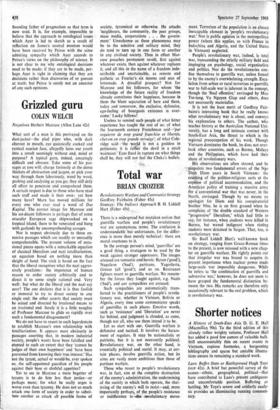Grizzled guru
COLIN WELCH
Negations Herbert Marcuse (Allen Lane 42s) What sort of a man is this portrayed on the dust-jacket—the pied piper who, with dark cheroot in mouth, eye quizzically cocked and cynical saurian face, allegedly lures our youth into a revolt seemingly without end, mind or purpose? A typical guru, indeed, amazingly difficult and obscure. Take some of his pas- sages as you will; charge furiously at the dense thickets of abstraction and jargon, or pick your way through them laboriously, word by word, probing and analysing as you go; they still defy all effort to penetrate and comprehend them. A certain respect is due to those who have read such stuff and made it their own : yet how many have? Marx has moved millions for every one who ever read a word of Das Kapital. The correct image for Marcuse and his soi-disant followers is perhaps that of some oracular European sage shipwrecked on a tropical island, there to be venerated and hung with garlands by uncomprehending savages.
Nor is respect obviously due to those ex- tensive passages which are readily or unreadily comprehensible. The present volume of occa- sional pieces opens with a remarkable equation of classical liberalism and nazi totalitarianism, an equation based on nothing more than sleight of hand. The trick is based on the fact that the liberal recognises what the nazi aggres- sively proclaims : the impotence of human reason to order society arbitrarily and to direct it to some single rational end. Very well: but what do the liberal and the nazi say next? The one declares that it is thus foolish or immoral to try to direct society to any single end; the other asserts that society must be seized and directed by irrational means to an irrational end. Surely it is a little naughty of Professor Marcuse to glide so rapidly over such a fundamental disagreement?
We do not have to resort to such legerdemain to establish Marcuse's own relationship with totalitarianism. It appears most obviously in passages asserting that, in modern industrial society, people's wants have been falsified and stunted to such an extent that they 'cannot be judges of their own happiness' and 'have been prevented from knowing their true interest.' Has not the tyrant, actual or would-be, ever spoken so, the self-appointed guardian of his people against their base or slothful appetites?
Yet to see in Marcuse a mere begetter of tyrants is to do him less than justice—or perhaps more; for what he really urges is worse even than tyranny. He does not so much attack one form of society in order to substi- tute another as attack all possible forms of society, tyrannical or otherwise. He attacks, `neighbours, the community, the peer groups, mass media, corporations . . . the govern- ment.' Unwelcome as these phenomena may be to the sensitive and solitary mind, they do tend to turn up in one form or another in any civilised society. Thus in effect Mar- cuse preaches permanent revolt, first against whatever exists, then against whatever replaces it, and all this in the name of a freedom inde- scribable and unattainable, as remote and pathetic as Fourier's six moons and seas of lemonade. A dreadful prospect? Not for Marcuse and his followers, for whom 'the knowledge of the future reality of freedom already constitutes their happiness, because in them the blunt separation of here and there, today and tomorrow, the exclusive, defensive, ego-feeling of bourgeois existence is over- come.' Lucky fellows!
Useless to remind such people of what bitter experience has taught the rest of us; of what the fourteenth century Frenchman said—`par requierre de imp grand franchise et libertes, chet-on en trop grande servaige; of what Cole- ridge said—`the wosld is not a goddess in petticoats; it is raMer the devil in a strait waistcoat.' Eyes fixed in rapture on what things shall be, they will not feel the Cheka's bullets.










































 Previous page
Previous page